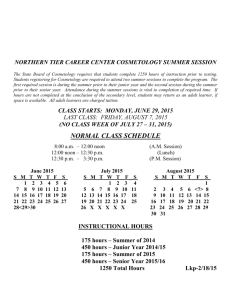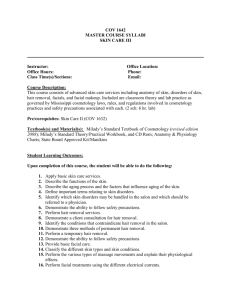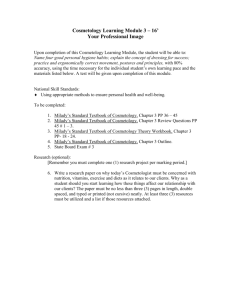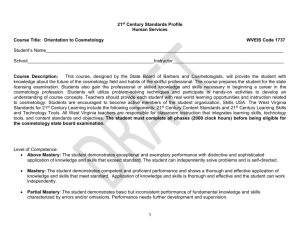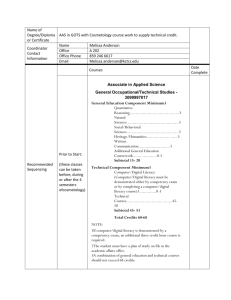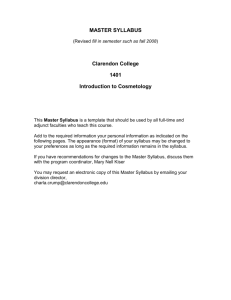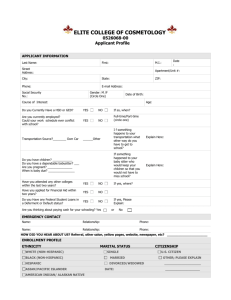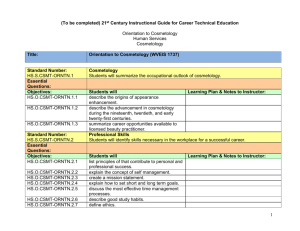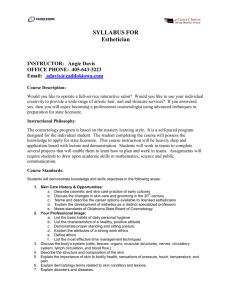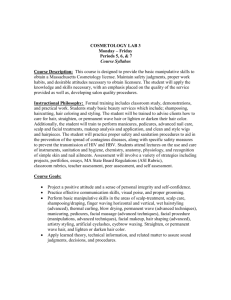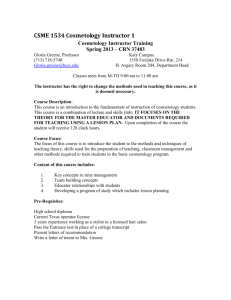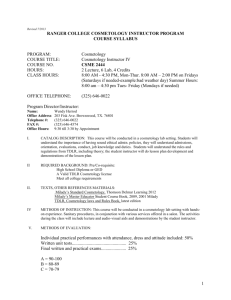Course ID Number - Coahoma Community College
advertisement
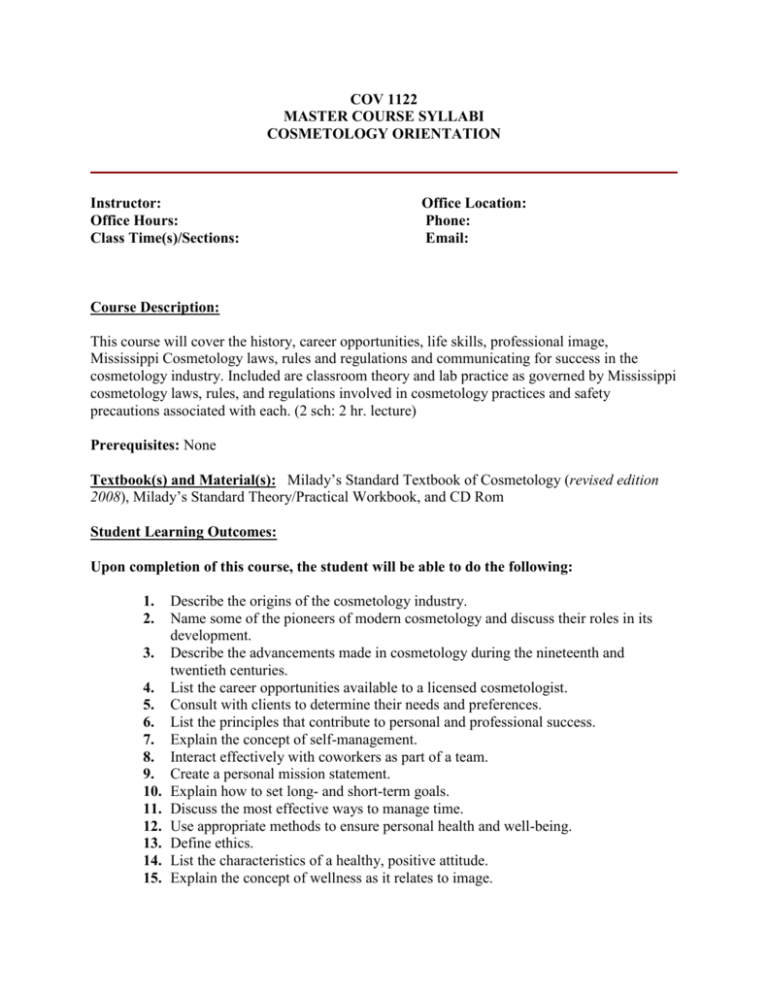
COV 1122 MASTER COURSE SYLLABI COSMETOLOGY ORIENTATION Instructor: Office Hours: Class Time(s)/Sections: Office Location: Phone: Email: Course Description: This course will cover the history, career opportunities, life skills, professional image, Mississippi Cosmetology laws, rules and regulations and communicating for success in the cosmetology industry. Included are classroom theory and lab practice as governed by Mississippi cosmetology laws, rules, and regulations involved in cosmetology practices and safety precautions associated with each. (2 sch: 2 hr. lecture) Prerequisites: None Textbook(s) and Material(s): Milady’s Standard Textbook of Cosmetology (revised edition 2008), Milady’s Standard Theory/Practical Workbook, and CD Rom Student Learning Outcomes: Upon completion of this course, the student will be able to do the following: 1. 2. 3. 4. 5. 6. 7. 8. 9. 10. 11. 12. 13. 14. 15. Describe the origins of the cosmetology industry. Name some of the pioneers of modern cosmetology and discuss their roles in its development. Describe the advancements made in cosmetology during the nineteenth and twentieth centuries. List the career opportunities available to a licensed cosmetologist. Consult with clients to determine their needs and preferences. List the principles that contribute to personal and professional success. Explain the concept of self-management. Interact effectively with coworkers as part of a team. Create a personal mission statement. Explain how to set long- and short-term goals. Discuss the most effective ways to manage time. Use appropriate methods to ensure personal health and well-being. Define ethics. List the characteristics of a healthy, positive attitude. Explain the concept of wellness as it relates to image. 16. List the basic habits of daily personal hygiene. 17. Explain the concept of dressing for success. 18. Describe methods for reducing stress. 19. Identify the basic principles of sound nutrition and exercise. 20. Demonstrate ways to improve posture, both standing and sitting. 21. Demonstrate an understanding of ergonomic principles and ergonomically correct postures and movement. Attendance: Regular class attendance and punctuality are expected. All arrangements for completing missed work are to be made with the instructor. It is the student’s responsibility to initiate these arrangements. The number of times a student may be absent can be found in your College Catalog on pages 64 and 65. Absence from Class for School Sanctioned Activities Students who are absent from class due to participation in an officially sanctioned school activity must present notice of the event to the instructor (at least one week prior is desirable) and request advance assignments. If the student is passing the course, the request for make-up will be honored. If missing the class will endanger the student's academic success, the instructor will notify the activity sponsor; the sponsor and the instructor will determine a decision regarding the student’s participation in the activity. In general, the decision will reflect the philosophy that students attend college for educational purposes, and participation in activities outside the classroom is recognized as a lower priority. Make-up Policy: The make up of any test will be at the discretion of the instructor. Failure to take test will result in a zero being recorded for that grade. No make up work will be done after three days of test. Cheating Policy/Plagiarism: Academic dishonesty, or cheating, can take many forms—plagiarism, copying off of another student's examination, obtaining copies of an examination prior to the examination date, or submitting someone else's work under your own name. No, not everyone does it, but recent studies indicate that cheating among college undergraduates is on the rise. If you are not familiar with the college’s policy, you should realize that by enrolling in this course you have informally but legally agreed to conform to the standard set forth in this syllabus. If reasonable evidence exists that indicates you have cheated, you will receive a failing grade for this course. Students assume full responsibility for the content and integrity of the academic work they submit. The guiding principle of academic integrity shall be that a student's submitted work; examinations, reports, and projects must be that of the student's own work. General advice and interaction are encouraged. Each person, however, must develop his or her own solutions to the assigned projects, assignments, and tasks. A student may not use or copy (by any means) another's work (or portions of it) and represent it as his/her own. Electronic Devices in Class: The use of cellular phones, pagers, CD players, radios, and similar devices is prohibited in the classroom and laboratory facilities. Non-Discrimination/Disability Policy: The Board of Trustees of Coahoma Community College has adopted a policy assuring that no one shall, on the grounds of race, color, national origin, sex, or disability, be excluded from participation in, be denied benefits of, or otherwise be subject to discrimination in any program, activity, or employment of Coahoma Community College. Coahoma Community College is committed to ensuring equal access to an education for enrolled or admitted students who have verified disabilities under Section 504 of the Rehabilitation Act of 1973 and the Americans with Disabilities Act of 1990. College policy calls for reasonable accommodations to be made for eligible students with verified disabilities on an individual and flexible basis. To receive disability support services, a student must register with the designated OCR (Office of Civil Rights) coordinator and provide appropriate documentation verifying the disability. For additional information, review page 16 of the Coahoma Community College 2005 – 2007 Catalog and/or contact the OCR (Office of Civil Rights) coordinators: Academic Coordinator – Evelyn Washington at 621-4148 or e-mail ewashington@coahomacc.edu; Career and Technical Coordinator – Anne S. Clark at 621-4220 or e-mail asheltonclark@coahomacc.edu. GRADING SCALE/SYSTEM: The Coahoma Community College grading scale is as follows: The Grading scale SCALE Q.POINTS 100-92 4 A 91-83 3 B 82-74 2 C 73-65 1 D BELOW 65 0 F Mississippi State Board of Cosmetology: (rule 401: I. B. 3) EXAMINATION ELIGIBILITY Transcript of completion in all courses must reflect a grade average of no less than 85%. This outline is intended as a guideline for the course. The institution and the instructor reserve the right to make modifications in content, schedule, and requirements as necessary to enhance each student’s educational experience and student learning outcomes. COV 1122 COSMETOLOGY ORIENTATION TENTATIVE SCHEDULE OF CLASS ASSIGNMENTS/TESTS WEEK 1 2 3 4 5 6 7 8 9 10 11 12 13 14 15 16 ASSIGNMENTS/TESTS DATE DUE
